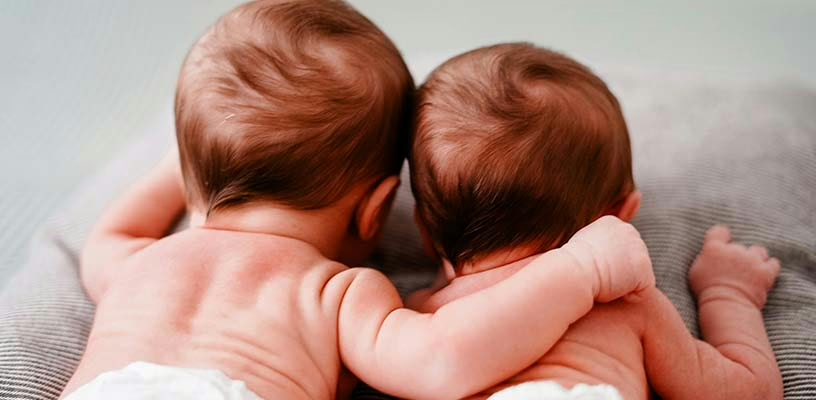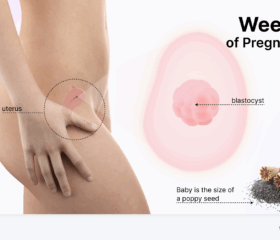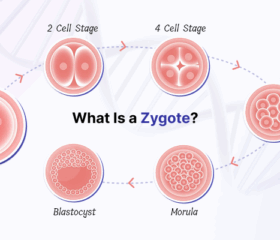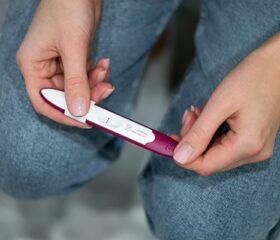Early Signs You May Be Pregnant With Twins or Multiples
Are you feeling more tired, hungry, or nauseous than your fellow moms-to-be? Those could be signs that you’ve got twins on the way.

- How early in pregnancy can you find out whether you’re carrying twins?
- What are the early signs of twins or multiples?
- How do doctors confirm twin pregnancies?
- Can you tell if you’re having fraternal or identical twins?
- How likely are you to have twins?
- What is vanishing twin syndrome?
- Final thoughts
Many expectant moms have a gut feeling they’re having twins even before their doctor confirms it. In addition to your instincts, there are other signs you can look out for that suggest you may have multiple bundles of joy in your belly.
Read on to learn all about twin pregnancy symptoms, how your doctor will confirm you have twins, and the differences between fraternal and identical twins.
How early in pregnancy can you find out whether you’re carrying twins?
A lot of expectant moms get a feeling they’re carrying twins very early on in the first trimester of pregnancy. However, there’s no way to confirm you’ve got more than one bun cooking in the oven before your first pregnancy ultrasound.
You’ll usually have your first ultrasound when you’re between 6 weeks and 12 weeks pregnant, although if you have certain symptoms, you could also get one as early as week 5 of your pregnancy. 1 2 3
While your pregnancy symptoms can give you clues as to whether you’re expecting multiples (more on this below), an ultrasound is the only reliable way of confirming a twin pregnancy.
What are the early signs of twins or multiples?
By and large, women carrying twins will have more pronounced pregnancy symptoms than those with one baby.
If you’re carrying twins, you may see signs like: 4
- Intensified morning sickness: Nausea and vomiting are common during early pregnancy for all women. However, if you’re carrying twins, you’ll likely experience more severe morning sickness (e.g., more frequent vomiting or prolonged nausea) than women expecting singletons usually get.
- Extreme pregnancy fatigue: When you’re expecting twins, your body has to work harder to support two developing babies. You’ll have elevated hormone levels, and, as mentioned, you may have more intense morning sickness. As a result, you may feel more tired than women with singleton pregnancies (although, since fatigue is such a common first-trimester symptom, it can be hard to gauge this).
- Increased appetite: It stands to reason that you might feel hungrier if you’re growing two babies in your belly. After all, your body needs the extra fuel and nutrition.
- Rapid weight gain: Expectant mothers of twins often start gaining weight in pregnancy earlier and more quickly because of their increased hormone levels and higher nutritional needs. As this can also happen in singleton pregnancies, it isn’t a reliable indicator of having multiples.
- Showing sooner: As you can imagine, two growing babies will expand your uterus more quickly than just one baby. 5 Correspondingly, your bump may show sooner if you have twins.
- Fetal movement in multiple places: Some women report feeling fetal movement in different areas of their abdomen when they’re pregnant with twins. These movements will become more noticeable when you’re around 20 weeks pregnant.
- Digestive issues: Due to the increased pressure in the abdominal area, you might experience more frequent heartburn, indigestion, and constipation during your pregnancy.
Keep in mind that not all twin pregnancies are the same. While many women experience more intense symptoms with twins, that isn’t universally true, and it’s also possible to experience extreme pregnancy symptoms with just one child. Intensified symptoms can be suggestive, but they aren’t proof of anything.
How do doctors confirm twin pregnancies?
Since you can’t tell for sure whether you’re carrying multiples from your symptoms alone, you’ll need to get confirmation from your doctor.
As mentioned, the only reliable way of confirming a twin pregnancy is through an ultrasound. The scan lets the doctor see the number of gestational sacs and fetuses in your belly. Your doctor may perform the ultrasound by placing the probe in your vagina (more common in early pregnancy) or on your belly and pelvic area.
Other methods of confirmation
Doctors sometimes look at other metrics that can suggest (without confirming) that you’re carrying multiples. Specifically, they can check: 4
- Weekly hCG levels: During pregnancy, your body produces the hormone human chorionic gonadotropin (hCG). Your hCG level may be much higher if you have a twin pregnancy. Your doctor may perform a blood test to check your hCG during your checkup.
- Second heartbeat: If your doctor uses a fetal Doppler ultrasound (to check if your baby’s heart has started beating) during your prenatal visit, they may detect a second heartbeat if you’re carrying twins. They will order an ultrasound for further confirmation if you haven’t gotten one already.
Prenatal care is especially important in a twin pregnancy
There’s a higher risk of complications (e.g., preterm birth, low birth weight, preeclampsia, gestational diabetes, and a C-section delivery) with twin pregnancies. You’ll need specialized care and more doctor appointments than mothers with singleton pregnancies, and may be referred to a high-risk OB specialist in Maternal-Fetal Medicine for additional ultrasounds. You may also need to deliver at a hospital equipped with a NICU, as you’re at a higher risk of preterm delivery. 6
Can a home pregnancy test tell you whether you’re expecting twins?
Unfortunately, a home pregnancy test can’t tell you whether you’re carrying twins or multiples.
You may already know that a home pregnancy test detects your hCG levels to confirm that you’re expecting. It’s true that you may have higher levels of hCG if you’re carrying twins. However, a home pregnancy test (which checks for the presence of hCG in urine) can only confirm whether you’re pregnant—not exactly how much hCG you’re producing or the number of babies you’re carrying.
A blood test (performed at a clinic or your doctor’s office) can give you a more precise idea of how high your hCG levels are, but as other things can cause higher-than-average levels besides carrying multiples, even that isn’t proof of anything.
Can you tell if you’re having fraternal or identical twins?
Once you’ve confirmed that you’re expecting twins, you’ll probably get curious about what kind of twins you’re having—fraternal or identical. Here are the main differences between them: 7
- Identical twins: Also called monozygotic twins, identical twins develop from the same fertilized egg that splits into two. They share the same genetic makeup and sex and often look very similar.
- Fraternal twins: By contrast, fraternal twins, or dizygotic twins, develop from two separate eggs fertilized by two different sperm. They’re genetically as similar as any siblings but are not genetically identical, and may or may not be the same sex.
A doctor can sometimes come up with an educated guess about what type of twins you’re having during an ultrasound based on the number of placentas you’re developing (most identical twins share a placenta, while fraternal twins usually have their own placentas). 8
Non-invasive prenatal testing (NIPT) or genetic testing during pregnancy can sometimes help determine which type of twins you’re carrying (as well as what sex they are), at least in some circumstances. However, generally, a DNA test after pregnancy is the only definitive way to determine if your twins are identical or fraternal.
How likely are you to have twins?
In general, the odds of getting pregnant with twins are pretty low. Twins occur naturally in about 1 in every 250 pregnancies. 9
While anyone can conceive twins, certain factors can increase the odds of having fraternal twins: 10
- Age: Women over 40 are less likely to get pregnant; however, a successful pregnancy at that age has a higher chance of resulting in a twin pregnancy.
- Fertility treatments: Any fertility treatment that stimulates ovulation or involves implanting multiple embryos can increase the chances of a twin or triplet pregnancy.
- Weight: Women with a higher body mass index (BMI) at conception are more likely to conceive twins. That’s because their bodies have a higher chance of releasing multiple eggs simultaneously.
- Race: Black women have a higher chance of having fraternal twins, while Asian women are less likely to have them.
- Family history: If you have a family history of having fraternal twins, you’re more likely to carry twins.
To reiterate, these factors affect your likelihood of having fraternal twins. No specific factors can increase your likelihood of conceiving identical twins, which happens randomly and can’t be predicted.
What is vanishing twin syndrome?
Vanishing twin syndrome (VTS) is a kind of miscarriage that may happen if you have a multiple pregnancy. It typically occurs early in the pregnancy, typically during the first trimester. 11
Essentially, VTS is when one embryo stops developing, and its tissue is absorbed by the mother’s body; the process is harmless, but you may experience some bleeding. If it happens, you’ll notice that an embryo that was present in an early ultrasound is no longer present in a later ultrasound.
Some mothers may have VTS without ever knowing it if they have their first ultrasound later in pregnancy.
Final thoughts
Learning that you’re pregnant with twins is exciting (although it can also be scary).
Whether you spotted the telltale signs of twins or just have a hunch, schedule a doctor’s appointment to confirm right away. This way, you can get the advice you need early on if you do, indeed, have twins or other multiples.
Article Sources
- Cleveland Clinic. "Ultrasound in Pregnancy" Retrieved September 19, 2025.
- Florida Agency for Health Care Administration. "Ultrasound" Retrieved September 19, 2025.
- UT Southwestern Medical Center. "Patience is key: Understanding the timing of early ultrasounds" Retrieved September 19, 2025.
- University of Rochester Medical Center. "Symptoms and Diagnosis of Multiple Pregnancy" Retrieved September 19, 2025.
- Brigham and Women's Hospital. "FAQs About Pregnancy with Twins, Triplets and More" Retrieved September 19, 2025.
- Office on Women's Health. "Twins, triplets, and other multiples" Retrieved September 19, 2025.
- National Human Genome Research Institute. "Fraternal twins" Retrieved September 19, 2025.
- Minnesota Center for Twin and Family Research. "MTFS Twin Info and Frequently Asked Questions" Retrieved September 19, 2025.
- Cleveland Clinic. "Twin Pregnancy" Retrieved September 19, 2025.
- Ohio State Health & Discovery. "What increases the odds of having twins?" Retrieved September 19, 2025.
- Children's Hospital of Philadelphia. "Complications of Multiple Pregnancy" Retrieved September 19, 2025.







